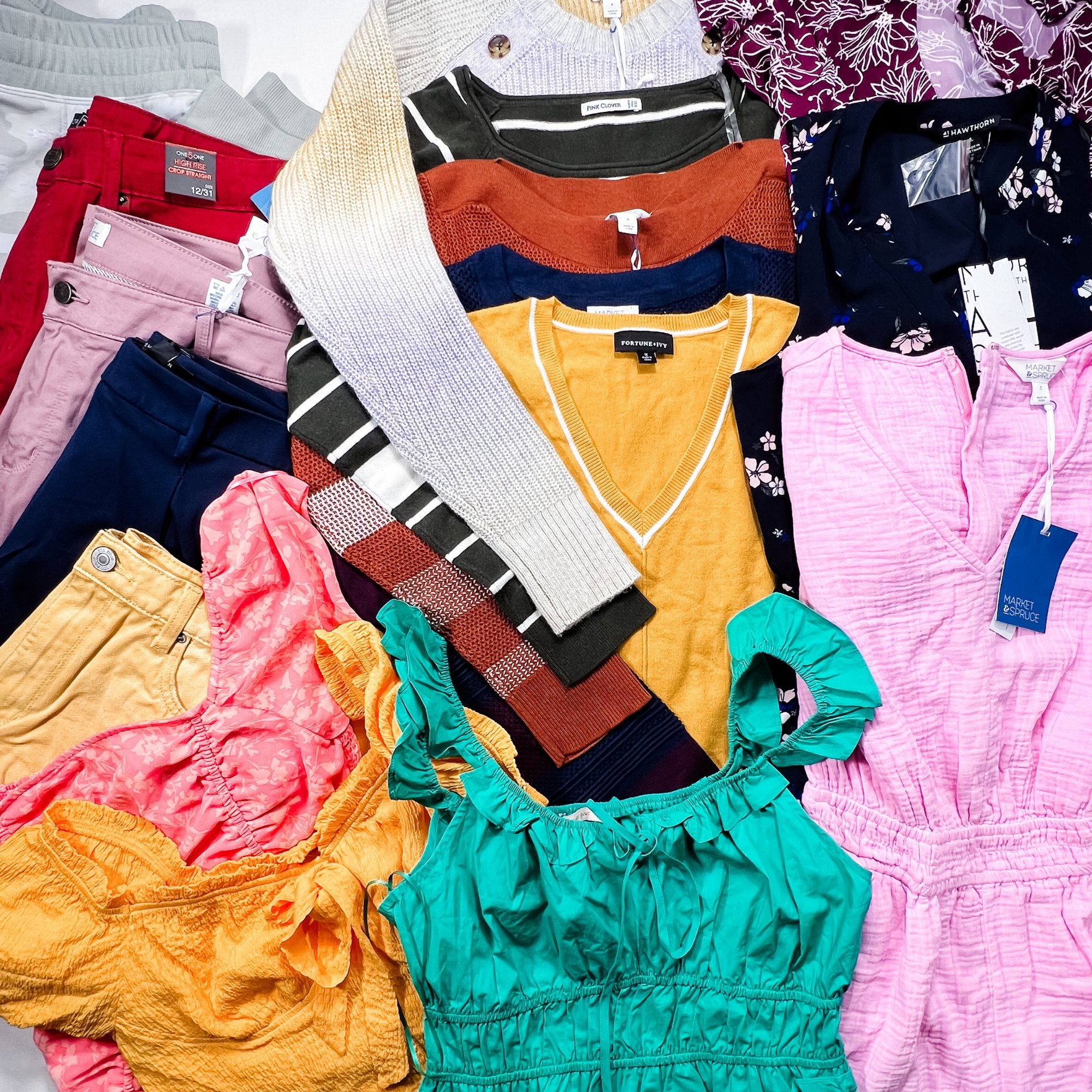How Fabric Choices in Branded Clothing Affect Comfort and Style
How Fabric Choices in Branded Clothing Affect Comfort and Style
Blog Article
The Value of Sustainable Clothes: Exactly How It Influences the Atmosphere and Your Wardrobe
Lasting apparel is increasingly identified for its crucial role in decreasing the ecological effect of the fast garment industry. By concentrating on green products and honest manufacturing methods, it addresses pressing environmental worries. This shift not only benefits the world but also affects consumer options, leading to a much more thoughtful approach to closet administration. Recognizing these dynamics elevates crucial inquiries concerning fashion's future and personal responsibility in forming it.
The Ecological Footprint of Rapid Style

Benefits of Sustainable Materials
Sustainable materials supply substantial benefits, specifically through eco-friendly textile options that minimize ecological injury. These products likewise show resilience and longevity, minimizing the need for constant replacements. As an outcome, they contribute to a much more lasting apparel industry and advertise accountable consumer behavior.
Eco-Friendly Textile Options
While the garment industry has long been connected with rapid trends and ecological injury, the increase of environment-friendly fabric options offers a transformative opportunity. Sustainable materials such as organic cotton, hemp, and Tencel have acquired appeal as a result of their reduced environmental effect. These textiles are usually created without harmful chemicals and require much less water, minimizing their carbon footprint - Branded Clothing. Furthermore, numerous eco-friendly textiles are eco-friendly, contributing to a circular economic climate by lessening waste. Choosing lasting products not just sustains environmentally accountable practices however additionally promotes healthier communities. As customers end up being much more mindful of their buying power, the need for green textiles encourages brand names to introduce and adopt even more sustainable manufacturing approaches, inevitably benefiting the world and future generations
Toughness and Long Life Advantages
Several consumers are progressively acknowledging the sturdiness and durability benefits of lasting materials in their clothes selections. Unlike conventional fabrics, lasting materials such as natural cotton, hemp, and recycled polyester are engineered to endure deterioration, leading to garments that last longer. This reduced frequency of replacement not only saves consumers money with time however also lessens waste created by quick fashion. In addition, sustainable clothing typically employs environment-friendly production methods that boost material toughness, adding to a decrease in the general carbon footprint. By spending in durable garments, consumers can cultivate a much more lasting closet while delighting in top quality items that preserve their aesthetic and performance in time. Toughness and longevity stand as key advantages of selecting sustainable materials.
Minimizing Waste Through Sustainable Practices
Reducing waste in the apparel industry can be accomplished with ingenious techniques such as upcycling and repurposing products. Additionally, adopting minimalist wardrobe approaches motivates consumers to focus on top quality over amount, ultimately decreasing garments usage. With each other, these techniques contribute greatly to an extra sustainable clothing design.
Upcycling and Repurposing Products
Upcycling and repurposing materials have actually become ingenious approaches in the fashion business, changing thrown out textiles into important brand-new products. This approach not just lessens waste however also motivates imagination and originality in garments design. By taking old garments and materials, designers can create distinct items that mirror individual design while decreasing the demand for new sources. Furthermore, upcycling often needs much less power and water contrasted to typical production procedures, substantially lowering the environmental footprint of fashion. As consumers end up being extra knowledgeable about sustainability, the popularity of upcycled clothing remains to rise, promoting a circular economy. Inevitably, these practices add to an extra sustainable future, where fashion focuses on environmental health over quick production and consumption.

Minimal Closet Approaches
As people increasingly look for to minimize their environmental impact, embracing minimalist closet strategies has actually acquired grip as an effective strategy to lasting fashion. These methods emphasize top quality over quantity, encouraging consumers to curate a smaller sized collection of functional, sturdy clothing. By concentrating on ageless items that can be combined and matched, people can decrease the regularity of purchases and ultimately reduce waste.Additionally, minimalism advertises mindful intake, prompting buyers to reflect on the moral and environmental ramifications of their choices. This strategy not just promotes an extra lasting way of life yet likewise simplifies everyday decision-making pertaining to clothes. As individuals embrace minimal principles, they add to a fashion society that values sustainability and responsible consumerism, eventually bring about an extra eco-conscious look what i found society.
The Duty of Moral Labor in Sustainable Style
While lots of customers are increasingly mindful of the environmental consequences of their clothes options, the importance of moral labor techniques in lasting fashion can not be ignored. Honest labor incorporates fair incomes, risk-free working conditions, and respect for employees' civil liberties, forming the backbone of accountable fashion production. Brand names that focus on ethical labor not only boost communities but likewise established a criterion for responsibility in the industry.Moreover, the assimilation of honest methods fosters transparency, making it possible for consumers to make enlightened selections regarding their acquisitions. This technique contrasts greatly with fast style's unscrupulous labor models, which usually prioritize profit over people. By sustaining business devoted to honest labor, customers add to a system that values human dignity together with ecological sustainability. Consequently, honest labor is not simply an add-on; it is important to the more comprehensive goal of lasting style, ensuring that the quest for eco-friendliness does not come with the expenditure of civils rights.
The Influence of Sustainable Clothing on Carbon Emissions
Lasting apparel has the potential to greatly lower carbon discharges connected with the style market. Conventional garment production adds especially to greenhouse gas exhausts, mainly as a result of energy-intensive manufacturing processes and the usage of non-renewable sources. In contrast, lasting style concentrates on eco-friendly materials, such as organic cotton or recycled fibers, which usually require less power to produce.Moreover, sustainable brand names have a tendency to embrace much more reliable production methods, decreasing waste and lowering total exhausts. By prioritizing resilience and timeless layout, sustainable clothing motivates customers to purchase less frequently, additional lowering the carbon impact connected with overconsumption.Additionally, several lasting brands are committed to openness in their supply chains, making it possible for consumers to make informed choices that align with their worths. Ultimately, shifting in the direction of sustainable clothes can result in a considerable reduction in carbon discharges, contributing to a much healthier earth and a more sustainable future for the fashion industry.
Supporting Local Economic Situations With Sustainable Selections
The change towards sustainable apparel not only addresses ecological problems but likewise significantly advantages local economic climates. By selecting lasting fashion, consumers often sustain small organizations and regional artisans, boosting community strength. These ventures normally operate on a smaller sized scale, focusing on workmanship and ethical techniques over mass production.Investing in locally made sustainable clothes promotes job creation and stimulates economic growth within communities. As consumers come to be extra knowledgeable about the environmental effect of their acquisitions, they increasingly seek products that mirror their values. This need urges neighborhood manufacturers to embrace sustainable methods, contributing to a round economy.Moreover, supporting neighborhood organizations reduces transport emissions, lining up with eco-conscious consumer habits. The interconnectedness of lasting clothes and regional economic situations underscores the essential role that individual choices play in advertising both ecological see and economic wellness. By promoting these neighborhood links, neighborhoods can flourish while likewise working towards an extra sustainable future.
Transforming Your Closet: Tips for a Sustainable Closet
As individuals look for to reduce their environmental effect, changing a closet into a sustainable closet comes to be a necessary step. One reliable strategy is to examine existing clothes, keeping just items that are worn regularly and that straighten with sustainability goals. Prioritizing high quality over amount is vital; spending in sturdy pieces from eco-friendly brand names can considerably decrease waste.Additionally, including second-hand things can revive a closet while minimizing environmental damage. Organizing clothes swaps with friends or contributing extra things can further advertise sustainability.When buying, people should seek materials that are organic, recycled, or biodegradable, and stay clear of quick style stores - Branded Clothing. Exercising mindful intake by attentively considering each acquisition can add to a much more lasting lifestyle. By applying these ideas, one can create a wardrobe that reflects personal style while sustaining environmental stewardship
Regularly Asked Inquiries
How Can I Recognize Lasting Clothing Brands?
To identify sustainable garments brands, one ought to research products used, check for accreditations like Fair Profession, and analyze the brand's transparency about their production procedures, labor methods, and ecological effect, ensuring ethical and eco-friendly practices are prioritized.
What Are the Expenses Associated With Sustainable Style?
The costs related to lasting style can differ browse around these guys substantially. Higher manufacturing expenditures, honest sourcing, and environment-friendly products often cause boosted list prices, which might hinder some consumers while interesting ecologically mindful buyers.
Can Lasting Clothes Be Stylish and Fashionable?
Sustainable apparel can indeed be fashionable and stylish. Designers significantly focus on innovative products and moral manufacturing methods, verifying that style and sustainability can exist side-by-side. Customers now have varied choices that mix looks with environmental awareness.
Just How Does Washing Clothing Affect Their Sustainability?
Washing clothing substantially impacts sustainability by consuming water and power, adding to air pollution, and causing microplastic release. Constant washing can break down materials, reducing their lifespan and boosting the requirement for substitutes, inevitably worsening environmental worries.
What Is the Life Expectancy of Sustainable Garments Contrasted to Fast Style?
The life expectancy of sustainable clothing generally exceeds that of fast style things, often long-term numerous years as a result of quality products and craftsmanship. In comparison, rapid style garments might degrade quickly, requiring even more regular substitutes. Sustainable clothing is progressively identified for its essential duty in reducing the ecological influence of the quick style sector. While lots of customers are increasingly conscious of the ecological consequences of their clothes selections, the significance of ethical labor practices in lasting style can not be overlooked. Branded Clothing. Sustainable clothing has the prospective to significantly minimize carbon discharges linked with the style sector. In contrast, sustainable fashion concentrates on environment-friendly products, such as natural cotton or recycled fibers, which usually require much less power to produce.Moreover, lasting brands have a tendency to embrace more effective manufacturing practices, minimizing waste and lowering overall discharges. By prioritizing longevity and classic style, lasting clothing urges customers to acquire less regularly, additional minimizing the carbon impact linked with overconsumption.Additionally, many lasting brand names are committed to openness in their supply chains, making it possible for customers to make educated choices that align with their worths
Report this page